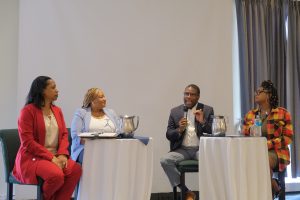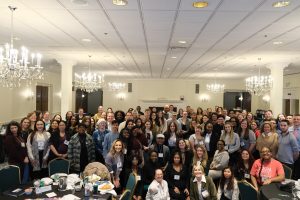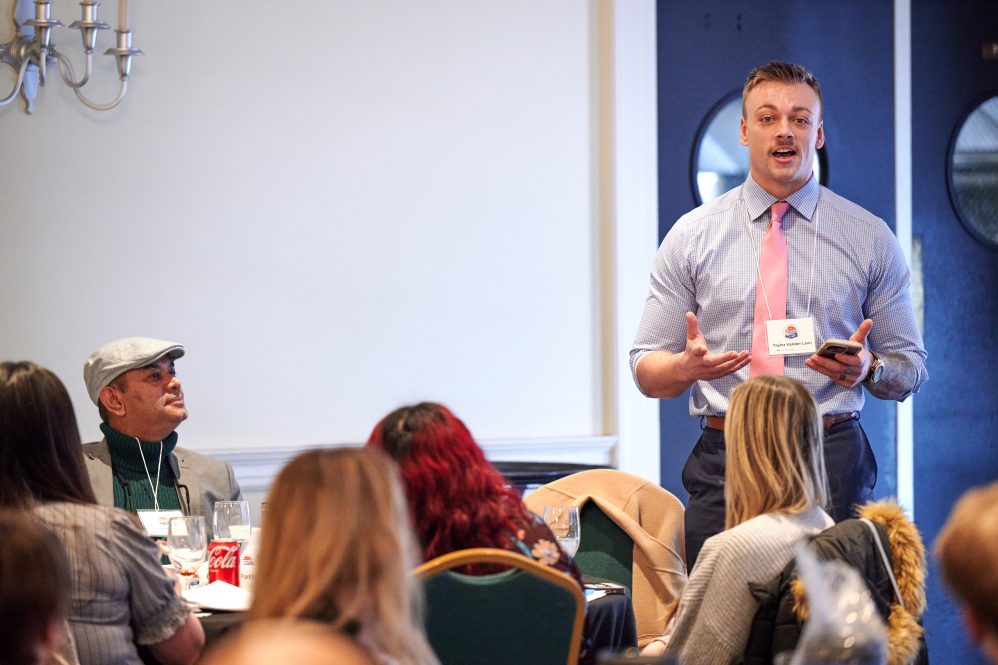“Consider yourself asked” is the tagline and central message of the Campaign School for Social Workers, held this year on February 23 and 24 in Hartford. For two days every year, the Campaign School brings together students, social workers, faculty, and advocates with the goal of inviting them to engage in politics and campaigns as volunteers, advocates, and candidates.
“Politics can feel like an insiders’ game, so we work to give attendees the knowledge, skills, and confidence to participate. We want them to know they belong, and they are qualified to run for office,” says Tanya Rhodes Smith, director of The Nancy A. Humphreys Institute for Political Social Work at the UConn School of Social Work (SSW).
In a presidential election year like this one, national politics dominate the news and social media. But decisions that are made at the state and local level have just as much impact—if not more—on the daily lives of citizens. “Many issues like clean water, education, economic development, policing and safety, environmental policy, and zoning are decided at the local level,” she adds.
“Healthy democracies foster healthy people. When more people participate in civic life through voting and political engagement, there are significant benefits to communities and individuals, including better outcomes in areas like employment, education, and health,” Rhodes Smith says. Through her work as Humphreys Institute director and an instructor in residence at UConn SSW, she examines voting as a social determinant of health, collaborates on research related to political participation and efficacy, and leads programs like the Campaign School for Social Workers that work to bring more people into civic life.
What started as a small training in 1996 now brings together more than 120 students, social workers, and faculty from across the country as well as internationally. According to Rhodes Smith, more than a dozen schools, including Stonybrook University, Howard University, Michigan State University, the University of Tennessee, the University of Houston, and the University of Dusseldorf in Germany, send cohorts of students every year. This year, attendees represented 16 states and 25 colleges and universities. The Campaign School also welcomed UConn students, including from UConn’s Leadership Legacy Experience program, the School of Public Policy, and the new Civic Leadership Program through UConn’s Office of Engagement.
Political Social Work
The Humphreys Institute was founded in 1995 to increase the political participation and power of social workers, as well as the communities they serve. This vision of Nancy A. Humphreys, a former dean at UConn SSW, is a driving force behind the Campaign School, which is in its 28th year. At this year’s event, UConn SSW Dean Laura Curran welcomed participants and acknowledged the lasting legacy of Humphreys.

In her opening remarks, Rhodes Smith highlighted that social work was founded as a political profession. The first woman elected to Congress, Jeanette Rankin, the first female Cabinet Secretary, Frances Perkins, and the longest serving female Senator, Barbara Mikulski were all social workers. “Social work in Connecticut is different than in most other states,” said Rhodes Smith. “When we walk into our state Capitol, it’s social workers we see throughout the building. We have eight elected social workers in the state legislature, which is the highest of any other state, and many more who serve on school boards, city councils and other offices.”
Day One of Campaign School 2024 focused on the nuts and bolts of electoral campaigns, including messaging, fundraising, and networking. “The skills you will learn today apply to any leadership practice,” said Kate Coyne-McCoy, a lead trainer on Friday. Coyne-McCoy is a social worker who has trained more than 9,000 individuals to run for elected office, is a former candidate for Congress, and leader of the Harvard Kennedy School’s From Harvard Square to the White House Program.
Throughout the two days, the Campaign School brought together elected officials and former candidates for important conversations about what it’s really like to work on a campaign, serve in office, and navigate barriers as people of color or other historically marginalized individuals. Rhodes Smith pointed out that nearly every one of the panelists is a social worker: “The Campaign School is taught through the lens of social work’s professional values and Code of Ethics. This rises above party politics. We work to show them how their professional and personal values can help them navigate in a system that will challenge them every day.”
Connecticut State Rep. Anne Hughes, D-135th District (Easton, Redding, Weston), and Franklin Perry II, chief of staff for the Connecticut House Democrats, joined Coyne-McCoy to tackle the question, “What’s it really like on a campaign?” Perry, who is a social worker and lawyer, said “…a social work degree is a degree that touches every single industry and that ranges from health care to education to government to the law.” He shared a riveting story about how his longtime friend and colleague, Speaker of the House Matt Ritter, D-1st District (Hartford), won his first race by just two votes.
During the panel Hughes recalled how she first got into politics after 2016. “We’re social workers,” she said. “We’re comfortable knocking on people’s doors.” Despite being a first-time campaigner, she flipped a seat in her district and has held office ever since.
Social Work and Democracy
On Day Two, State Rep. Kai Belton, MSW, D-100th District (Middletown); New York Duchess County legislators Cristin McCarthy-Vahey, MSW, and Barrington Atkins, MSW; and Bethany Board of Education member Shannon Lane ’09 Ph.D., joined a morning panel called “Inside the Studio.” The panelists shared how they use their professional identities, training, values, and ethics to shape their agendas and lead. That discussion was moderated by MSW student Emmy Franklin and Bridgeport Board of Education member Jennifer Perez, who attended the Campaign School last year.
Another theme of the Campaign School is the importance of representation in politics. “Democracy reflects the priorities of those who participate, so it matters who votes, who is elected to office, who shapes policy, and who is counted,” says Rhodes Smith.

Social workers are trained to look around to see who is missing from circles of power. Rhodes Smith points out that one of the most important and powerful discussions, “Representation is Power,” centered those voices and their experiences. Ayesha Clarke ’06 (CLAS) ’18 MSW, executive director of Health Equity Solutions, moderated the discussion with League of Women State Board Member Bianca Shinn, MS, MPH; former Bridgeport mayoral candidate Lamond Daniels, LCSW; and Katrina Huff-Larmond, MSW, City Council member in Randolph, Massachusetts, about how they navigate issues of racism and difference in politics, and how social workers can build and support a more representative, inclusive and responsive democracy.
These issues could not be more important this election year. The growth and impact of the Campaign School – with more than 2,600 alumni from across the country and globe – are evident in the increasing number of Campaign School veterans who have gone on to serve as elected officials, leaders, advocates, and organizers.
“Social workers are beautifully interwoven within the fabric of society in ways I had never considered. The Campaign School represented a chance for me to continue to explore my social work identity, commitment to social justice, and belief in being a change agent – now within the political arena,” said Yvonne Mbewe, LCSW, a Ph.D. student at UConn SSW and a Civic Leadership Program participant.
To date, more than 15 schools of social work and chapters of the National Association of Social Workers (NASW) have brought the Campaign School for Social Workers to their universities, including The Ohio State University and University of North Carolina Wilmington. There are two more Campaign Schools planned for March, one hosted by the University of Tennessee and another hosted by a consortium of 11 schools and the National Association of Social Workers (NASW)-PA in the Philadelphia area.
The event was supported by Fairfield County’s Community Foundation Fund for Women and Girls, the Connecticut Chapter of the National Association of Social Workers, and Jo Nol.



